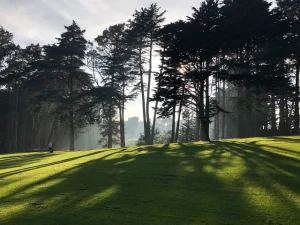The fog rolled in shortly after 5 p.m. at Cypress Point Club, blanketing some of golf’s most iconic holes in a thick, white mist. And the Americans, as expected, dominated the final singles session on Sunday, turning a one-point advantage into a resounding Walker Cup victory.
As the last matches wrapped up, a four-point buck calmly strolled down the 17th fairway. Preston Stout, a skilled bow hunter, had just earned the winning point, nearly hitting a perfect approach at the penultimate hole. Moments earlier, the team’s veteran, 34-year-old Stewart Hagestad, hooped a 20-foot birdie putt at the par-3 15th to secure the retaining point in what ended as a 17-9 drubbing—the largest margin of victory since 2017 at Los Angeles Country Club, where Hagestad also clinched the win in his debut.
Hagestad is now 7-1 in Walker Cup singles, tied with William Campbell for second all-time among Americans. The U.S. team won 13 of 18 singles matches this weekend, posting an 8-1-1 score on Sunday afternoon, the most dominant performance since the final singles session expanded to 10 matches in 2009.
“You just look up there and there’s just red all over the board; I couldn’t believe it,” said U.S. captain Nathan Smith, a veteran of three Walker Cup teams. “I don’t know if I’ve ever seen a Walker Cup team bring it like they did this afternoon in singles.”
It was an anti-climactic ending to several days of golf nirvana on the legendary Dr. Alister MacKenzie gem, hidden from the golfing public for decades. Cypress Point hosted its only previous Walker Cup in 1981 and hadn’t been part of the PGA Tour rotation since 1990. This week’s re-unveiling came complete with high-def broadcast, mesmerizing drone shots, and plenty of sunshine to showcase it all. The course was the main attraction, especially for those lucky enough to walk MacKenzie’s “intoxicating natural journey through sea, sand and forest” while watching the world’s best amateurs display their talents. If this wasn’t golf’s best viewing experience in years, it was close.
The Walker Cup, now 50 editions strong, creates experiences that the Ryder Cup simply can’t. There could never be a Ryder Cup at Cypress Point—the event’s scale is too massive for the 6,600-yard layout. The same applies to future Walker Cup venues like Lahinch and Pine Valley. Even when the Walker Cup heads to Oakmont in seven years, the experience will differ drastically from this summer’s U.S. Open behemoth. While the PGA of America sells logoed napkins for hundreds online and scalpers drive up ticket prices, the USGA kept Cypress modest—no grandstands, just two large tents for hospitality and merchandise that fit within the club’s driving range and along the first fairway. This wasn’t an easy ticket, but those who got in experienced a purer, more intimate spectacle than the circus we’ll see at Bethpage soon.
At the Walker Cup, future meets past on golf’s grandest stages. Where else can you find Bryson DeChambeau, Ian Poulter and Masters chairman Fred Ridley walking the fairways like everyone else? Matt Kuchar brought his oldest son Cameron, a TCU commit, to Cypress for a few days before playing in Napa this week. Their trip culminated on this foggy Sunday evening with front-row seats on the Pacific’s version of Amen Corner. Kuchar’s ever-present smile reinforced the truth that it’s impossible to have a bad day in these parts.
Even for the losing Great Britain and Ireland side, whose hopes were crushed quicker than a back-to-front putt on Cypress’ 18th green, these weren’t good walks spoiled.
“The memories these kids are going to have are going to last a lifetime,” said Dean Robertson, GB&I’s captain, who suffered a similar drubbing as a player at Interlachen in 1993. Only two GB&I squads have won Walker Cups on U.S. soil, none since 2001 at Ocean Forest. The Americans own the all-time series 40-9-1 and have now won 9 of 11 and five straight.
Hagestad has been part of every victorious U.S. team in what’s now the longest win streak since eight consecutive victories ending in 1987. In his previous four Walker Cups, he was a shoo-in, but a right-elbow injury last summer opened the door for Evan Beck, who won last year’s U.S. Mid-Amateur and other mid-am majors. Beck passed Hagestad in the world rankings, though Hagestad closed the gap late with a T8 at the Northeast Amateur and a Sweet 16 appearance at the Western Amateur while Beck struggled. Before action ended at Olympic Club, Smith called Hagestad to inform him of the committee’s decision.
When Hagestad’s clinching putt dropped Sunday evening, two years’ worth of emotions poured out.
“Having tennis elbow was a total thorn in the side,” Hagestad said later, walking back to the clubhouse soaked from a misty closing ceremony. “To get that solved and feel like I was chasing the whole year, we gave up a lot, personally, professionally, and there are a lot of people—they know who they are—who deserve thanks. I’m grateful to be picked, but then you know some people went to war for you, so I’m glad I had the opportunity to make them know that decision was a good one.”
With the Walker Cup switching to even years, Hagestad will likely earn his sixth nod next September at Lahinch. That would draw him within three of the late Jay Sigel, the American record holder who died in April from pancreatic cancer at 81. “There will only ever be one Jay Sigel,” Hagestad stated. “I’m not trying to be Jay Sigel. His record is truly unparalleled… But to even be referenced in the same conversation is pretty humbling.” While he knew Sigel, Hagestad’s role model was Smith, the 47-year-old insurance salesman from Pennsylvania who won a record four U.S. Mid-Amateurs and the inaugural U.S. Amateur Four-Ball with Todd White.
“He’s an icon of the modern-day world of amateur golf,” Hagestad said of Smith, who will also captain in Ireland.
The admiration is mutual.
“Stew and I, we’ve had a great relationship for years,” Smith said. “With some of the things he’s done with Mid-Ams, playing in majors, I think that’s brought us together. He’s asked me questions. I think we’ve bonded through that. I totally love his game, respect his game, and really just couldn’t imagine being a captain on a Walker Cup team and him not being on my team.”
Hagestad will undoubtedly follow Smith as captain someday. As for his nine teammates, they’ll all eventually turn pro, like every one of Hagestad’s previous compatriots—nine guys from that 2017 U.S. squad earned PGA Tour cards, including world No. 1 Scottie Scheffler and fellow major champion Collin Morikawa; Hagestad was the only exception.
Jackson Koivun is already Tour-bound, having locked up his card via PGA Tour University’s Accelerated program. Koivun, a junior at Auburn, proved his professional mettle with three top-11 finishes in Tour events this summer. Smith leaned on the world’s top-ranked amateur for all four sessions, and Koivun delivered with a 3-1 performance, tying Western Amateur champion Jase Summy for most points this week.
When Koivun closed out Tyler Weaver, GB&I’s best player at No. 10 in the world, Smith shook his hand and said, “Thank you for playing.” He then tossed him the keys to his golf cart.
“When your best player is your hardest working player, it sets the tone for the team,” Smith said. “I said, ‘Yeah, go drive the cart, you’ve been driving it all week. I’m just going to ride along in the passenger side.’ That sums it up.”
Smith added that as his guys painted Cypress red, he sought shade under a cypress tree.
The only American without at least a half-point in Sunday singles was NCAA individual champion Michael La Sasso, who couldn’t replicate an opening foursomes victory with Summy. La Sasso lost both Sunday matches, including an alternate-shot bout against Scots Niall Shiels Donegan and Cammy Adam, during which an R&A referee scolded the Ole Miss player for laying his putter down between himself and the cup after not being given a short putt on the third hole. While Robertson said afterward, “No harm done,” the gamesmanship fired up the GB&I side, which had flipped a huge point Sunday morning when Luke Poulter and Charlie Forster rallied from 4 down through 10 holes to beat Stout and Ethan Fang.
But the Americans had a reversal of their own, with Koivun and Tommy Morrison winning each of the last two holes to beat Weaver and Connor Graham, who went 2-1-1 over four sessions to lead the visitors. Morrison followed by taking down Donegan in singles, while Ben James, Jacob Modleski and Fang added closing full points, the latter by Sunday’s most lopsided score, a 6-and-5 beatdown of mid-amateur Stuart Grehan.
Fang and Koivun now head north for this week’s Procore Championship, which will be Fang’s PGA Tour debut.
Mason Howell, meanwhile, will head back to high school.
The 18-year-old from Thomasville, Georgia, hadn’t even dreamed of playing a Walker Cup when he finished his junior year last May. Then came back-to-back 63s in U.S. Open qualifying, a spot in the U.S. Open at Oakmont, medalist honors at the U.S. Junior, and his improbable U.S. Amateur victory—where he didn’t even know the winner earned an automatic Walker Cup berth until the quarterfinals. Howell’s hot play continued at Cypress, starting with an albatross on the par-5 second during Friday’s practice round, followed by long birdie putts on 15 and 16, and a hole-out eagle from 147 yards at 17 to seal his Sunday foursomes win with Modleski.
“I couldn’t even tell you what’s been going on these last two months,” Howell said.
Smith had high praise for the University of Georgia commit who works with Harris English’s childhood instructor, Bill Connally.
“It was like I had found Superman,” Smith said. “I couldn’t believe how well he was playing. Just this week through our practice sessions, you get to see everybody’s game, and I really couldn’t believe it up close. Just an incredible young man, mature beyond his years, and I think we’re going to be treated to some incredible golf by him for the next decades.”
Like Hagestad, Howell’s name is penciled in for next year’s Walker Cup, which would make him the first college-bound player to compete in two Walker Cups before hitting a collegiate shot. Miles Russell, the 16-year-old who was first alternate this year, should join Howell, though Koivun, James, Morrison and La Sasso will likely turn pro before then.
GB&I could retain more key players than the Americans, most notably Weaver, Graham, Poulter and Donegan. Robertson hasn’t received word about returning, as rumors suggest the R&A might tap former Ryder Cup captain Paul McGinley to lead in his native country. McGinley went 1-2 in his only Walker Cup, in 1991 at Portmarnock.
Regardless of who captains GB&I next, the 51st Walker Cup will begin with the U.S. having won nine of the past 11 contests. Every two years, more people suggest changes—fewer points, more points, added formats, an additional day, even expanding the GB&I pool to include continental Europe. This event has evolved since its 1922 inception, when eight-man teams played four 36-hole foursomes matches and eight 36-hole singles matches over two days. But further tweaks, beyond perhaps stretching the current format to three days, risk this great competition losing its identity.
Robertson’s mantra all week was, “If they can believe, they can achieve.”
GB&I wasn’t lacking belief, taking 21 of 26 matches to at least the 16th hole. The Americans, with each of the top six amateurs in the world, were simply stronger and significantly deeper (Howell was their lowest-ranked player at No. 143, over 300 spots better than Ireland’s Gavin Tiernan). Not even a Friday night video message from Rory McIlroy—”Please beat them because I know we’re going to beat them at Bethpage”—could inspire an upset in enemy territory.
Yet GB&I will demand no help. After this week, its players will pick themselves up, emerge from the fog and try again in a year’s time. Just like they’ve always done.





